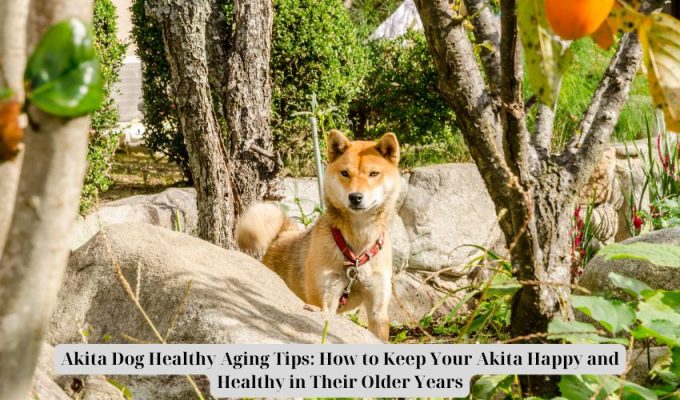Discover essential Akita Dog healthy aging tips to ensure your beloved companion stays happy and healthy in their later years.
Understanding Akita Aging Process
As Akitas age, they may experience a variety of health issues and changes in their behavior and physical abilities. It’s important for Akita owners to be aware of these changes and to provide appropriate care and support for their aging pets.
Common Aging Issues for Akitas
– Joint problems: Akitas are prone to musculoskeletal issues such as arthritis and hip dysplasia as they age. This can lead to stiffness, lameness, and difficulty getting up or moving around.
– Dental problems: Dental disease is common in aging dogs, including Akitas. Regular dental care and monitoring for signs of dental issues are important for maintaining your Akita’s overall health.
– Skin and coat changes: Akitas may develop skin conditions such as sebaceous adenitis and allergies as they age. It’s important to monitor their skin and coat for any changes and seek veterinary care as needed.
– Eye and vision issues: Some Akitas may develop eye problems as they age, such as uveodermatologic syndrome and pemphigus foliaceus. Regular eye exams and monitoring for changes in vision are important for senior Akitas.
Caring for Aging Akitas
– Regular veterinary check-ups: As Akitas age, it’s important to schedule regular veterinary visits to monitor their health and address any age-related issues that may arise.
– Proper nutrition: Providing a balanced diet and appropriate nutrition for aging Akitas can help support their overall health and address specific age-related concerns such as joint health and skin issues.
– Exercise and mobility support: Aging Akitas may benefit from gentle exercise and mobility support to help maintain their physical abilities and prevent discomfort from joint issues.
– Comfort and quality of life: As Akitas age, it’s important to prioritize their comfort and quality of life. Providing a comfortable living environment, appropriate pain management, and support for any age-related health issues can help senior Akitas thrive in their later years.
Understanding the aging process for Akitas and being proactive in addressing age-related health concerns can help ensure that senior Akitas receive the care and support they need to live happy and healthy lives.

Proper Nutrition for Aging Akitas
As your Akita ages, it’s important to adjust their diet to meet their changing nutritional needs. Older Akitas may require a diet that is lower in calories to prevent weight gain and reduce the risk of arthritis and other joint problems. Additionally, their metabolism may slow down, so it’s important to provide them with a diet that is easily digestible and packed with essential nutrients.
Key Nutritional Considerations for Aging Akitas
– Protein: Older Akitas may benefit from a diet that is slightly lower in protein to reduce the strain on their kidneys. However, it’s important to ensure that the protein they do consume is of high quality and easily digestible.
– Healthy Fats: Omega-3 fatty acids are beneficial for aging Akitas as they can help support joint health and reduce inflammation. Look for a senior dog food that contains sources of healthy fats such as fish oil or flaxseed.
– Joint Support: Consider a diet that includes glucosamine and chondroitin, which can help support joint health and mobility in aging Akitas.
– Weight Management: As Akitas age, they may become less active, making them more prone to weight gain. Choose a senior dog food that is formulated to support weight management and contains a balanced amount of calories.
In addition to providing a balanced and age-appropriate diet, it’s important to monitor your aging Akita’s weight and adjust their portion sizes as needed. Regular veterinary check-ups can also help ensure that your Akita’s nutritional needs are being met as they age.
Exercise and Activity for Aging Akitas
As Akitas age, it’s important to adjust their exercise and activity levels to accommodate any physical limitations they may develop. While they may not be as energetic as they once were, regular exercise is still important for maintaining their overall health and mobility.
Low-impact activities
Consider incorporating low-impact activities such as leisurely walks, gentle swimming, or short play sessions into your Akita’s routine. These activities can help keep them active without putting too much strain on their aging joints and muscles.
Mental stimulation
In addition to physical exercise, it’s important to provide aging Akitas with mental stimulation to keep their minds sharp. Puzzle toys, obedience training, and interactive games can help keep them engaged and mentally active.
Regular veterinary check-ups
As your Akita ages, it’s crucial to schedule regular veterinary check-ups to monitor their overall health and address any age-related concerns. Your veterinarian can provide guidance on appropriate exercise and activity levels based on your Akita’s individual needs.
By adjusting your aging Akita’s exercise and activity routine and providing them with the necessary physical and mental stimulation, you can help them maintain a healthy and fulfilling lifestyle as they grow older.
Routine Veterinary Care for Aging Akitas
As your Akita gets older, it’s important to continue providing routine veterinary care to ensure she stays healthy and comfortable in her golden years. Regular check-ups with your veterinarian can help identify any age-related health issues early on, allowing for prompt treatment and management. Your vet may recommend more frequent visits as your Akita ages to monitor her overall health and address any specific concerns that may arise.
Common Age-Related Health Concerns
– Arthritis: Older Akitas may experience joint stiffness and pain due to arthritis, which can impact their mobility and quality of life. Your vet can provide guidance on managing arthritis symptoms through medication, supplements, and lifestyle adjustments.
– Dental Health: Aging dogs are more prone to dental disease, which can lead to tooth loss and other health issues. Regular dental check-ups and cleanings are essential to maintain your Akita’s oral health.
– Vision and Hearing: As Akitas age, they may experience changes in their vision and hearing. Your vet can assess your dog’s sensory functions and recommend appropriate interventions to support her overall well-being.
By staying proactive with your Akita’s veterinary care, you can help ensure that she enjoys a comfortable and fulfilling life as she enters her senior years.
Environmental Adaptations for Aging Akitas
As your Akita ages, there are several environmental adaptations you can make to ensure that she remains comfortable and safe. Here are some key considerations:
Comfortable Sleeping Area
As your Akita gets older, she may develop joint pain or arthritis, making it important to provide a comfortable and supportive sleeping area. Consider investing in a orthopedic dog bed to provide extra cushioning and support for her joints.
Easy Access to Food and Water
As your Akita ages, she may have difficulty reaching her food and water bowls if they are placed at a height that requires her to bend down. Consider placing her bowls at a comfortable height to reduce strain on her neck and back.
Slip-Proof Flooring
Older Akitas may experience difficulty with mobility, especially on slippery surfaces. Consider adding rugs or non-slip mats to areas where your Akita spends the most time to provide better traction and stability.
Regular Exercise
While it’s important to adapt your Akita’s environment to accommodate her aging needs, it’s also crucial to ensure she continues to get regular exercise. Gentle walks and low-impact activities can help maintain her mobility and overall health.
By making these environmental adaptations, you can help ensure that your aging Akita remains comfortable, safe, and happy in her home.
Quality of Life and Mental Well-Being for Aging Akitas
As your Akita ages, it’s important to focus on maintaining her quality of life and mental well-being. Regular exercise, mental stimulation, and a comfortable living environment are key factors in ensuring that your aging Akita remains happy and healthy. Providing her with a comfortable bed, a quiet space to rest, and plenty of opportunities for gentle exercise will help to keep her physically and mentally engaged.
Exercise
Regular, low-impact exercise is important for aging Akitas to help maintain their muscle tone and joint flexibility. Short, leisurely walks and gentle play sessions can help to keep your dog active without putting too much strain on her aging body. Mental stimulation, such as puzzle toys and training exercises, can also help to keep her mind sharp and engaged.
Diet and Nutrition
As your Akita gets older, her nutritional needs may change. It’s important to provide her with a balanced diet that is appropriate for her age and activity level. Speak with your veterinarian about any dietary adjustments that may be necessary to support your aging Akita’s overall health and well-being.
Veterinary Care
Regular veterinary check-ups become even more important as your Akita ages. Your veterinarian can monitor her health and address any age-related concerns, such as arthritis or vision changes. Keeping up with preventive care, such as vaccinations and parasite control, is also essential for maintaining your aging Akita’s overall health.
By prioritizing your aging Akita’s quality of life and mental well-being, you can help ensure that she enjoys her golden years to the fullest. Providing her with love, attention, and the necessary care will go a long way in keeping her happy and comfortable as she ages.
In conclusion, to ensure a healthy aging process for your Akita dog, it is important to provide regular exercise, a balanced diet, regular vet check-ups, mental stimulation, and plenty of love and attention. By following these tips, you can help your Akita live a long and healthy life.



